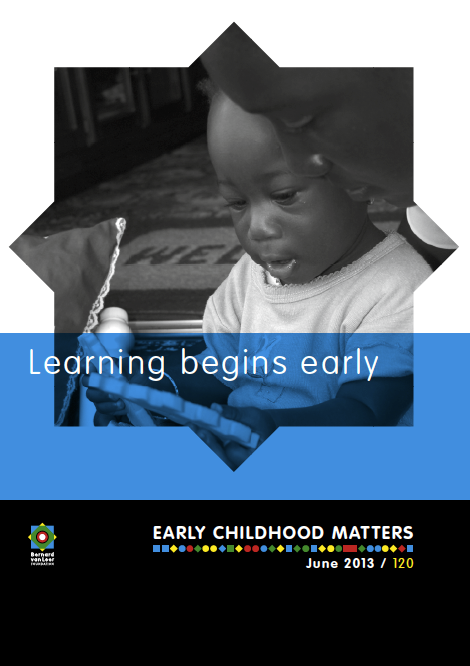Early Childhood Matters Magazine Feature
 While findings from neuroscience and economics together make a powerful case for societies investing more in children’s first 3 years, a huge challenge still lies ahead to persuade policymakers to see this life stage as a strategic priority. While many countries collect basic health data to monitor survival and physical health indicators for under-3s, case studies and data collection are needed to establish a clearer understanding of what policies and interventions work In supporting infant emotional and brain development.
In “Providing a path to early success: securing the foundation for learning”, Joan Lombardi and Rebecca Sayre call for an integrated and comprehensive approach to supporting early childhood development.
While findings from neuroscience and economics together make a powerful case for societies investing more in children’s first 3 years, a huge challenge still lies ahead to persuade policymakers to see this life stage as a strategic priority. While many countries collect basic health data to monitor survival and physical health indicators for under-3s, case studies and data collection are needed to establish a clearer understanding of what policies and interventions work In supporting infant emotional and brain development.
In “Providing a path to early success: securing the foundation for learning”, Joan Lombardi and Rebecca Sayre call for an integrated and comprehensive approach to supporting early childhood development.
“Every year, more than 130 million children are born, most of them in low- and middle-income countries. Although child mortality has fallen by 41% since 1990, in 2011, 6.9 million children died before reaching their fifth birthday, many from causes that are both treatable and preventable….The factors that threaten or promote a child’s survival are most often those that either support or undermine a child’s healthy development and early learning.” Four of the most important of these factors are:
Poverty and Inequality: “While many children survive the adverse conditions that come with an early life in poverty, such conditions undermine the potential of this developmental period. They can contribute to family stress, compromise family well-being, and prevent access to health services and the enriched experiences that are crucial for early learning. The cumulative impact increases the chances of long-term consequences.”
 Maternal health and well-being: “Not only maternal health but also maternal education is important to the long –term development of children. Over the past four decades, the global increase in women’s education has prevented more than 4 million child deaths. Educated women are more likely to delay child rearing, be able to resist violence, and participate in the political process. Yet female adult literacy continues to be an issue. In at least 63 countries around the world, young women from poor households are significantly less educated than in other sectors of society (UN Secretary General, 2012).”
Maternal health and well-being: “Not only maternal health but also maternal education is important to the long –term development of children. Over the past four decades, the global increase in women’s education has prevented more than 4 million child deaths. Educated women are more likely to delay child rearing, be able to resist violence, and participate in the political process. Yet female adult literacy continues to be an issue. In at least 63 countries around the world, young women from poor households are significantly less educated than in other sectors of society (UN Secretary General, 2012).”
 Early Health and Nutrition: “Lack of access to healthy living conditions and adequate nutrition continues to have a serious impact on the development of young children around the world. An estimated 15% of births result in low-birthweight babies and 27% of the children under age 5 around the world are moderately or severely stunted (UNICEF, 2012a)….Only 37% of babies around the world are exclusively breastfed within their first 6 months (UNICEF, 2012a) – and while this is often seen as a health issue, responsive breastfeeding also promotes nurturing interactions and stimulation that support development and early learning.”
Early Health and Nutrition: “Lack of access to healthy living conditions and adequate nutrition continues to have a serious impact on the development of young children around the world. An estimated 15% of births result in low-birthweight babies and 27% of the children under age 5 around the world are moderately or severely stunted (UNICEF, 2012a)….Only 37% of babies around the world are exclusively breastfed within their first 6 months (UNICEF, 2012a) – and while this is often seen as a health issue, responsive breastfeeding also promotes nurturing interactions and stimulation that support development and early learning.”
Early Childhood Experiences: “While most parents want the best for their young children, many are unprepared for parenthood – lack of information, family support, and economic resources undermines the kind of responsive parenting practices that allow quality caregiver-child relationships to develop…..Based on data from more than 20 countries on children under 5, the poorest children are at greatest risk of being left alone or with inadequate care, exposing them to increased risk of injury as well as abuse and neglect (UNICEF 2012c). Lack of paid leave and quality childcare undermines family well-being and puts children’s development at risk.
What policies can help lead to early success? “There is increasing evidence from around the world that reducing inequalities requires interventions that are integrated, as well as being of high quality and targeted to the most vulnerable (Engle et al, 2011).” Margaret Chan, Director General of the World Health Organization, states: “Three areas are critical foundations for healthy child development; stable, responsive and nurturing caregiving with opportunities to learn; safe, supportive, physical environments; and appropriate nutrition.” (Chan, 2013)
[hr]
Policies to support child development must also support the adults in their lives. “Parenting support can be delivered in a variety of ways: by integrating it into community health or nutrition programs, through home visiting programs, or through group family support programs such as mothers’ groups and special outreach to fathers. A focus on parenting does not have to stop when children enter childcare – in fact, family engagement should be a key element of a quality childcare program, along with trained staff, adequate space and supplies, and small groups.”[hr]

The three crucial steps needed to improve policy development and support of early childhood development are:
Improve data: “While UNICEF has made progress in developing indicators for children under the age of 5, and there are an increasing number of birth cohort studies being conducted around the world, new initiatives are needed to expand birth registration [about half of the births in the world still go unregistered (UNICEF, 2012a)], to develop improved measures of child well-being, and to disaggregate international and national data by age, poverty, community, and other demographic characteristics.”
Coordinate planning: “Given that the domains of development are integrated, early childhood policies must comprehensively address the needs of children. This calls for a coordinated approach across public agencies and throughout the developmental period. Coordinated planning across the sectors of health, education, social protection and child protection is necessary at the international, national and community levels…. Both vertical and horizontal alignment of policies is needed to assure continuity, increase efficiency and encourage better outcomes for children.”
Increase public awareness: “While public awareness about the early years has grown, there is still a gap between what science tells us and what the general public understands and demands. In this age of media and emerging technologies, we have new opportunities to increase public awareness and influence the behaviour of parents and policymakers. To make this happen, we need to build partnerships and recruit new allies – from the business community to law enforcement, health professionals, and faith-based organizations. We have to continue to talk about a child’s right to a good start in life and the importance of early investments to education, health, and the well-being of nations.”
Click here to access the Early Childhood Matters magazine.
